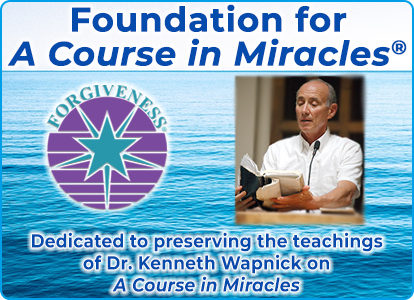Why A Course in Miracles is not New Age
Why A Course in Miracles
is not New Age
Kenneth Wapnick has maintained over the years that A Course in Miracles is not a New Age spirituality but rather has its intellectual roots in much earlier intellectual traditions, including the teachings of Plato, Neoplatonism, and the higher teachings of Gnosticism. The following are excerpts from a letter Kenneth had sent to the Library of Congress sometime in the 1990’s, requesting that they no longer classify the Course and Kenneth’s books under the category New Age. Kenneth’s efforts were successful.
A Course in Miracles in many crucial ways is in sharp disagreement with New Age thinking, with many principles discussed in the book conflicting with many New Age principles. Five examples of this kind of conflict are as follows:
1) The theory of A Course in Miracles is based on a non-dualistic metaphysics; it teaches that the physical universe (including the body) was not created by God, and in fact, came about as an attack on God. No New Age system would support this; they all teach just the opposite.
2) A Course in Miracles does not support the thinking involved in "prosperity consciousness," a prominent principle in New Age thought systems.
3) In almost all New Age systems there is an overriding emphasis on people's positive experiences, with scant lip service paid to the overwhelming unconscious feelings of guilt shared by most people. A Course in Miracles teaches that there is only one problem in the world, and that is guilt. Therefore, it focuses primarily on our feelings of guilt, teaching us how to identify them and undo them.
4) Another theme common to many New Age systems is the belief that we are God. A Course in Miracles is emphatic in teaching that we are not God; it teaches that God is our Source—we have been created by Him.
5) On a more general level, A Course in Miracles is distinguished from New Age thought systems in that it draws upon traditional Freudian psychoanalytic principles (e.g., denial and projection), and, within philosophical and spiritual contexts, upon the Neoplatonic tradition and themes common to early Christianity and the Gnostic systems of the second and third centuries. Our book Love Does Not Condemn: The World, the Flesh, and the Devil According to Platonism, Christianity, Gnosticism, and A Course in Miracles provides an in-depth exploration of these themes. Chapter 19 is especially helpful in understanding these conflicts.

